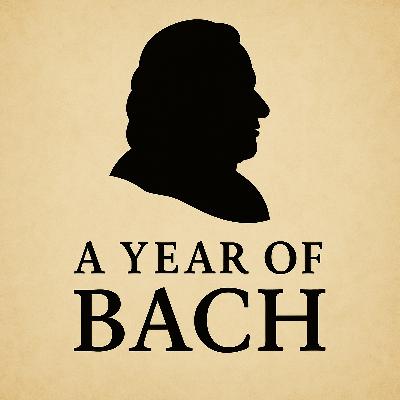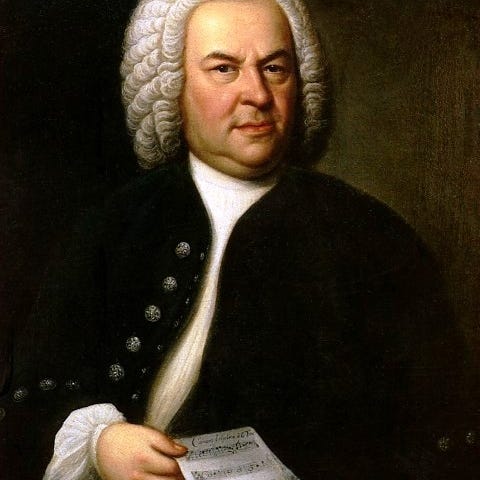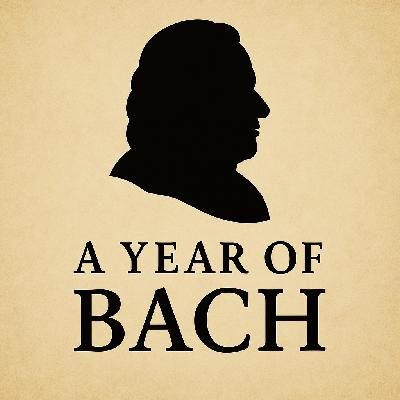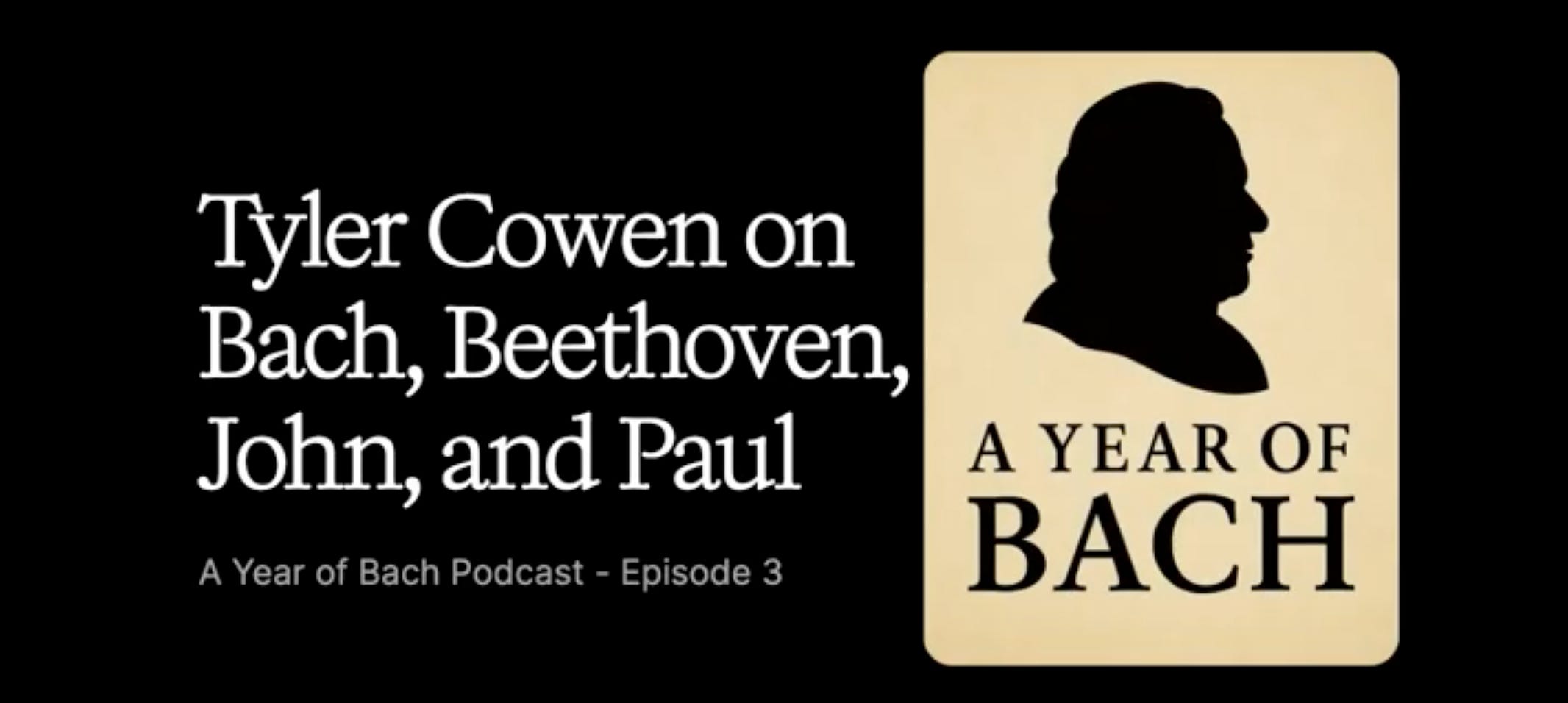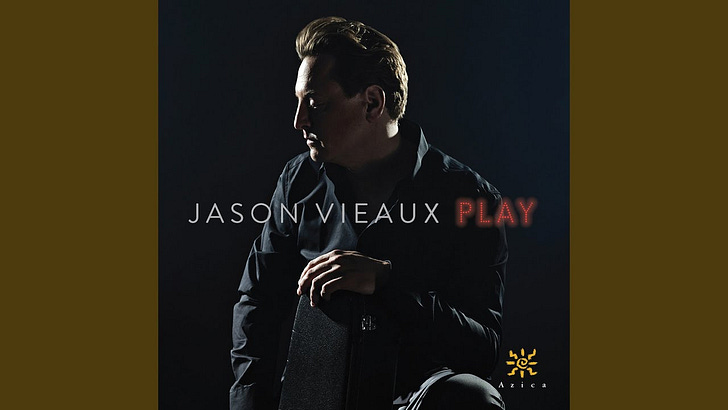The Expectation of Astonishment: Henry Oliver on Bach and the Hunger for Seriousness
Description
Episode 1 of the Year of Bach Podcast features Henry Oliver, author of the Substack The Common Reader, and the excellent book Second Act, a study of late bloomers in business and the arts.
Our open-ended conversation touches on Bach, Shakespeare, late blooming, and the pleasures and problems of Glenn Gould. Henry describes the “expectation of astonishment” in music and literature, and names his favorite recordings.
Links & references
* Henry’s Substack – The Common Reader
* Henry’s post on his favorite Bach pieces.
* The Second Act (Amazon)
* Selected recordings, with YouTube links:
* Henry’s favorite: Gould playing the Sinfonias live in Moscow
* My cantata gateway album: Lorraine Hunt Lieberson singing “Ich Habe Genug”
* My ‘dark horse’ record: Peter Schreier (tenor) and Karl Richter (organ) perform BWV 487 - “Mein Jesu, was für Seelenweh”
Support & subscribe
* Get the full transcript and future episodes straight to your inbox:
* Please share the show and rate it!
Intro music: Adagio of BWV 974, performed by your host on his home piano.
Transcript:
The Expectation of Astonishment: Henry Oliver on Bach and the Hunger for Seriousness
Evan Goldfine: Welcome everyone to the premiere episode of the Year of Bach podcast.
This series features a set of conversations with artists and writers who have a deep and personal connection to the music of J.S. Bach and how this music inspires and moves them throughout their lifetimes. Today my guest is Henry Oliver. I. Author of the recent bestseller, the Second Act, a Study of Late Bloomers in Business and the Arts.
He also writes the excellent Substack, the Common Reader, where he advocates for people to read the great classics of literature with a special emphasis on the works of Shakespeare and Jane Austen. He's also a great fan of Bach and a supporter of my substack from its earliest days, and I'm glad to have a readership that overlaps so strongly with his.
So, Henry, thank you for being my first guest, and I'm excited to talk to you about Bach today.
Henry Oliver: Oh, I'm delighted. This is, this is gonna be one of my favorite podcasts.
Evan Goldfine: You're setting me up. Okay. So Henry, why do you keep returning to Bach [00:01:00 ] throughout your lifetime?
Henry Oliver: Oh, because the best, the human, the human spirit loves what is best.
We love beauty, we love excellence. We love virtue. Bach embodies all of these things. You can hum him. You can have raptures about him. He can be fun, he can be serious. He’s the Shakespeare of music, right.
Evan Goldfine: Clearly. Do you, do you find it to be a more intellectual or emotional experience or both?
Henry Oliver: , more emotional. I think maybe that's because I don't understand music to, to a great degree, but I feel that Bach is able to find deep expressions of human feeling. I prefer the word feeling than emotion, deep expressions of human feeling and very subtle expressions of those things. So I think one reason why the cello suites are so, so universally popular is because they give [00:02:00 ] voice to a set of moods that have not really been expressed quite in that level of finery before or maybe since.
Evan Goldfine: Is there something there also about it being solo pieces along with the violin sonatas also That particularly triggers that emotional core for you.
Henry Oliver: I suppose so. I love the cello. I think that's probably the heart of it. And I think, again, they are some of his best works and, we respond, we do respond to excellence.
I believe that very strongly.
Evan Goldfine: Do you like the cello and piano sonatas?
Henry Oliver: I don't love them as much. I must confess. Martha Argerich is good at those, right?
Evan Goldfine: I, I have that album.
That's the one I know. You just pick her over everybody. That's easy. She's threatening to come to New York in a couple years, but we'll see.
Henry Oliver: Every time I listen to it, I'm not left feeling I want to go back.
Evan Goldfine: Wow. Yeah.
Henry Oliver: Yeah. That's the,
Evan Goldfine: [00:03:00 ] yeah, that's, it's disappointing because you want it to be also the best, but we can't have the best of everything.
Henry Oliver: No.
Evan Goldfine: Bach is clearly enriching your life and, and you've spent your career talking about literature mostly. So in what ways does music enrich your life? That, that literature cannot.
Henry Oliver: I've had a very strong response to music since I was young. And I have just had always a great hunger to listen to a lot of music.
I listen to much less than I used to because I prefer now to read in silence, and usually to write in silence as well. But what I said about Bach, giving an expression of feeling, I feel music can do that in a way that language can't. And people often talk about the limits of language.
The struggle to make words mean what you really want them to mean. The fact that when you are conceiving of something [00:04:00 ] to write, it has this big feeling inside you of what you're doing, and then when you get it onto the page, it always just seems a bit reduced and not quite what you were trying to capture.
Music, I think, gets you a lot closer to the thing you were trying to capture or express, but at the cost of language really means something that you and I can agree what it means.
Music is a much less precise form of communicative exchange, I guess. So I think those are the trade offs, but I come back to it because nothing else can express, his range of moods and feelings.
if you want to know, this is a, this is a great question. At the moment, I'm reading this book by Lamorna Ash. "Don't forget, we're here forever." And it's all about how people are turning back to religion. And she interviewed 60 young people who became Christians. And what she's interested in is how does that happen?
How does it come about that someone else becomes a [00:05:00 ] Christian? And this is a very difficult thing to get your head around if you're not a Christian. Right? Not just, what are all, what's all this theological talk? What are all these denominations? You believe this, someone else believes that. Just what does that feel ?
I just need to get into the vibes of this whole thing. Well, put some Bach on and you will very quickly be given the feelings of what it is to be devout, what it is to, to love God, what it is to feel the glory of God. Something that in your ordinary life may be incomprehensible to you, Bach can deliver up in a way that language, I think would struggle to break through those barriers.
Evan Goldfine: I often thought when I was listening to this music for my project, especially with the Passions and the Mass and B minor, the idea about sitting several centuries ago in a big cathedral or even a small church, and this was probably also the [00:06:00 ] loudest thing you ever heard.
Henry Oliver: Yeah.
Evan Goldfine: And the power of the voices and the orchestra together reverberating in the halls.
You're also in community with the people who are around you listening to this, I can't imagine the power of something that in a, in a great performance and, and to think about. Bach there. Also, I, I don't know if he was considered this, this great among, he was just the guy in town who was the composer who happened to have been pretty superlative relative to his peers.
But that was your local guy. And I should say that also that there's no evidence that Bach ever heard the Mass and B minor perform in his lifetime, which is crazy.
Henry Oliver: Absolutely crazy. People talk about Beethoven composing deaf, which obviously is, is fascinating, but I find this more fascinating how, how he managed to do that and, and leave it in such a state of completion and never hear it.
I mean, the power of the inner life must have [00:07:00 ] been much, much stronger than we are currently aware of. I think.
Evan Goldfine: Do you think we can have a good sense of Bach inner life? I mean, there's very limited extant writings of his that are not about pursuing a job here or there or writing and to try to placate a nobleman.
But that what can we know of, of Bach in ways that would be easier to understand some of the other greats internal lives, or maybe there's just that Romantic movement that is between us today and Bach's time.
Henry Oliver: I'm cautious about this. Someone Kingsley Amis once said, , you don't need to write a biography of a novelist.
He's told you everything about himself, and he's put it into a series of books called novels, but other novelists would deny that and say that it's just an exercise in the use of language. Now we don't believe them and we find all sorts of resonances between their actual lives and their [00:08:00 ] fictional lives.
I am very cautious of this, and I don't, I don't feel I have a good sense of Bach’s inner life. It's hard to believe that you can write the St. Matthew Passion and not have a very, very intense inner life. But I also know that he was busy. He had a job. He had kids, he was churning out music at a phenomenal rate.
And I don't know, I, I always just

